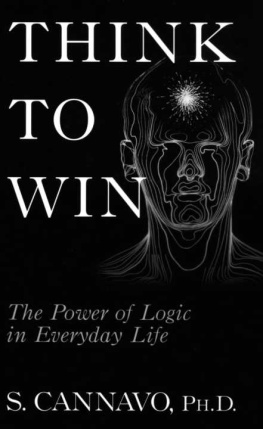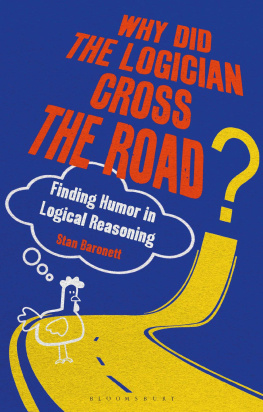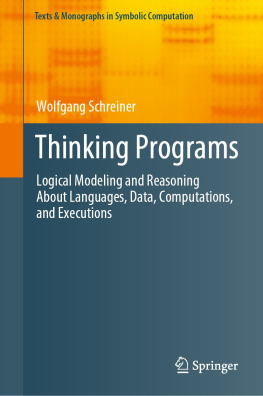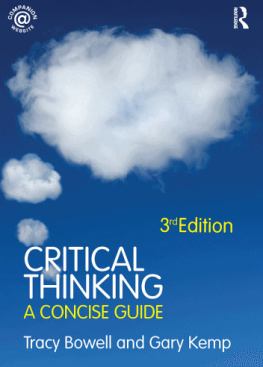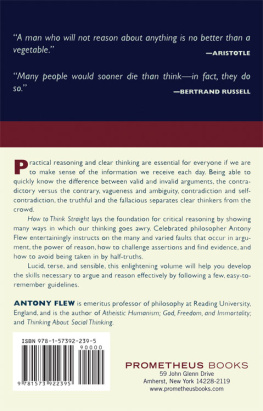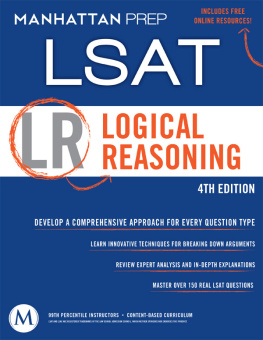
THINK
TO
WIN
THINK
TO
WIN
The Power of Logic
in Everyday Life
S. CANNAVO, PH.D.




ACKNOWLEDGMENTS
The students and colleagues from whom I have learned so much over the years while teaching philosophy and logic are more than I can name here. I thank them all and first.
I also wish to thank Queens College of the City University of New York for the opportunity to develop and teach "The Uses of Reason," in their cross-disciplinary program "Business Administration and the Liberal Arts." The strong emphasis which BALA placed on concrete applications did much to bring me closer to the practical.
My good friend Carl Heyel, editor and author of books on decision making, carefully read the entire text, getting so immersed as to come out of it ready for an honorary degree in practical logic. His many observations were invaluable.
But there are others to whom I am deeply indebted. The first of these is my literary agent, Alan Kellock, of the Kellock Company. He kept me going with unrelenting collegial effort and enthusiasm even when a serious back injury almost totally immo bilized me for a year. His editorial acumen and his review comments jump-started the tightening process so necessary in making our subject more accessible to the general reader.
For their reading select chapters and offering helpful suggestions I thank Professors Stanley Malinovich in the Department of Philosophy at Brooklyn College of CUNY and Robert Karmon in the Department of English at Nassau Community College of SUNY. Finally, I cannot fail to thank my editor, Kathy Deyell of Prometheus Books. Her remarkably masterful editing and her insightful, substantive recommendations are what made possible the final product.
And now for those close by who had no choice but to put up with me for so long. I thank Peter, my son, for having enough reserve compassion to take pity and throw me a line when I SOS'd. Besides being my earliest critic, he miraculously deciphered and keyboarded the first inscrutable, hand-written draft just before hurrying off to his own graduate studies at Harvard. The dearest and closest of my benefactors, though, was my wife, Gaetana-a superb teacher and brilliant poet whose genius for nuance and compression made her constant input a sine qua non of my literary existence. But I owe her for much more. Without her unwavering encouragement and loving support, the writing of this book would have remained a mere fantasy.
CONTENTS
PART ONE. HOW WE REASON:
The Anatomy of Argument
... 17
PART TWO. FALLACIES:
Seduction and Deception
PART THREE. THE TWO LOGICAL FORMS:
Deductive and Inductive
PART FOUR. IDEAS: CONCEPT SURGERY
HOW I CAME TO WRITE THIS BOOK
I owe the decision to write this book primarily to a former student, one of my very best, who popped into my office at the college one Friday afternoon. Francesca was now married and had mounted a few stress-rungs of the corporate ladder. She happened to be in the vicinity on business and stopped by to say hello.
Soon she asked with some disquiet if I could recommend a good book on how to think logically. She thought she really needed one. Too often at her department meetings, she knew the position she wanted to take-the position she thought was right -but couldn't formulate the convincing arguments that would get her there. She also longed to win more rounds with her husband, to pinpoint the fallacies she felt he sometimes committed in their discussions. Several of her friends complained of the same sort of thing. Would more reasoning have kept some of them out of the marital rapids they occasionally found themselves riding?
She went on to add that a few reasoning strategies would also be nifty at the local diner after the movies. With six or more people expressing opinions, the conversations tended to go in many directions at once, and that was okay, but it would be nice occasionally to focus things a bit more-to stay relevant and get to the bottom of some gnawing issue. She remembered how at one such gathering someone silenced her for the rest of the evening by accusing her of "begging the question." She was still not sure what he had meant.
But all of this was past or future. There was a real present problem-an urgent one. She was studying for her law exams (LSATs), and the logic questions on the practice sheets were impossible.
At this point, I handed Francesca one of our textbooks on reasoning, but she handed it right back. She didn't like textbooks-too dry. She'd had enough of them in the past.
What she was asking for was a pleasing, leisurely reading experience that would walk her through the subject. Her hope was to pick up useful background-possibly some kind of orientation or "logical literacy" that could serve as a guide, especially in those critical situations that called for stand-up thinking. "But, no rules, no formulas, no diagrams, and please, no exercises!"
Was there such a book? Somewhat abashedly, I confessed I knew of none.
She was surprised. With all the books on how to feel better, weren't there any on how to think better? Doesn't thinking better also mean feeling better, especially about yourself? You explain better, convince better, succeed better-even appeal better as a woman or man.
"For God's sake, write one!" she said impatiently. "We can all use it."
As the disappointed young woman thanked me and left my office, she had no inkling of the impact her visit would have.
Minutes later, while driving home, her urgent mandate rang in my ears and I began to fashion a few of my own thoughts on reasoning as a subject for the general reader.
Our three children were home for spring break and dinner talk that evening was a treat. The sentiment was unanimous. Wouldn't it be great to have something warm and engaging enough to hold any reader-something conversational and absolutely nonacademic, yet entirely true to the subject? "Really, Dad, all communicators could use it-students, parents, business managers. Even those of us in relationships."
I finally decided to start writing after I failed to find any book of the sort we had discussed. Store shelves that were brimming with tomes for putting us in touch with our feelings had nothing for putting us in touch with our thinking.
This book is a modest contribution toward filling that gap. Its aim is to acquaint the reader with those simple but hidden features of reasoning that make it the most empowering of human activities. I have attempted to offer a plain-language reading experience about cogent everyday thinking in real everyday contexts. To this effect, the examples in the discussion have been culled largely from the news, entertainment, friends, and personal experiences. The idea throughout has been to highlight the points of logic in the kind of everyday situations we can all relate to. Some of our examples therefore should and will ring very familiar to you.
The two payoffs of our reading journey are (1) an intimate, inside look at a most timely subject that-amazingly enoughhas been kept under academic wraps since the beginning of educational time and (2) a raised logical consciousness that can serve as the lifelong guide to better reasoning.
Next page
